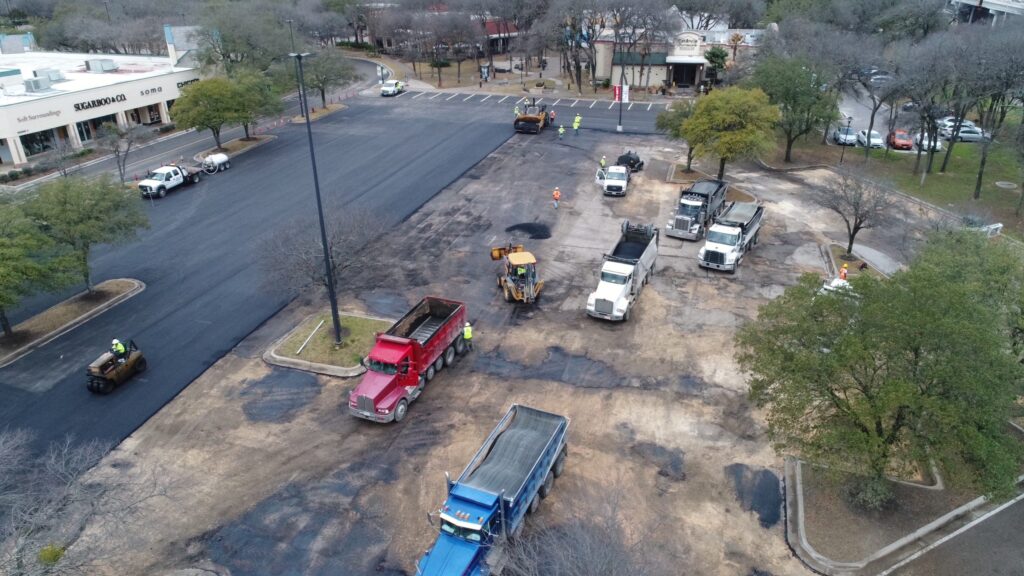 If you ask reputable asphalt contractors to construct or repave a street or parking lot, he will have several questions for you. The questions concerning the traffic to which the pavement will be subjected are of critical importance. His calculations for the design must include estimates for the number of different vehicle types that will use the pavement on an average day or during an average year. He will also want to determine which areas will be subjected to the heaviest loads or highest volume of traffic, the speeds at which they will be traveling and the likely distribution pattern of traffic. You may notice that your contractor is especially interested in the truck traffic and if you are wondering why, just keep reading.
If you ask reputable asphalt contractors to construct or repave a street or parking lot, he will have several questions for you. The questions concerning the traffic to which the pavement will be subjected are of critical importance. His calculations for the design must include estimates for the number of different vehicle types that will use the pavement on an average day or during an average year. He will also want to determine which areas will be subjected to the heaviest loads or highest volume of traffic, the speeds at which they will be traveling and the likely distribution pattern of traffic. You may notice that your contractor is especially interested in the truck traffic and if you are wondering why, just keep reading.
Asphalt Paving & Truck Loading – The Impact
Everything that goes into the construction of asphalt pavement, including the subbase preparation, the number of asphalt courses and the depth of each course, takes into account the type of loads that will be placed on the pavement. A pavement that experiences more or heavier loads than it was designed to bear can crack, subside or otherwise fail. However, if the pavement is designed for a high volume of heavy vehicles and does not experience that type of loading, the additional compaction that traffic is expected to provide will not occur, and the life of the pavement can be reduced.
The number of trucks is part of the equation, but it is also necessary to know the types of trucks. Trucks differ in their loaded weights, the number of axles, the number of tires in contact with the pavement and the distribution of weight on each axle. The calculation is quite complex, but in general, a truck bearing a single axle load of 36,000 pounds will inflict approximately 16 times as much damage as a single axle load of 18,000 pounds. A fully laden semi used for interstate transport inflicts damage on the pavement that is equivalent to 5,000 passenger vehicles.
Depending on the type of soil on which the pavement is constructed and the thickness of the base, the total asphalt thickness can be calculated once the load levels have been established. For example, a small parking lot, subdivision street or other pavement that is not expected to bear any heavy trucks will usually need between 3.5 and 4.5 inches of asphalt. Medium-volume thoroughfares may need up to eight inches of asphalt. Industrial parking lots and roadways, truck terminals and loading docks may require up to 10.5 inches of asphalt.
Why Choosing the Right Contractor Matters
If the contractor you choose does not take the time to evaluate the loads to which your new pavement will be subjected, you could end up with a pavement that will have to be replaced quickly, sometimes in less than five years. Even if you maintain your sealcoating, remove oil spills, have cracks repaired promptly and perform all of the other preventive maintenance procedures, the pavement will still have a much shorter life.
The cheapest quote is not always the one that will provide the most value. If you want a long-lasting, properly constructed asphalt pavement that will not need constant repair, you should select a reputable contractor with the experience to deliver quality work and the willingness to stand behind his work.
If you are looking for a paving contractor with an exemplary reputation and impeccable references, contact the experts at Alpha Paving Industries. We are an asphalt paving company in Austin, Tx. We provide a full range of paving services, including asphalt paving, asphalt overlays, sealcoating, milling, parking lot striping, concrete work, and asphalt repairs to customers in most Central Texas locations. Our customers include counties and municipalities, subdivisions, restaurants, HOAs, hotels, religious institutions, apartment complexes, shopping centers, educational facilities, airports, office complexes and healthcare facilities. If you have more questions about Asphalt Paving & Truck Loading or would like a free quote, use the online form to submit your request or call (512) 677-9001.




